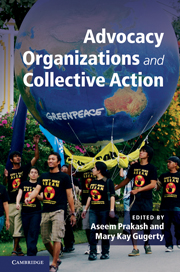Book contents
- Frontmatter
- Contents
- Figures and tables
- Contributors
- Preface
- Acknowledgments
- 1 Advocacy organizations and collective action
- Part 1 The institutional environment and advocacy organizations
- Part 2 Advocacy tactics and strategies
- Part 3 International advocacy and market structures
- 8 The political economy of transnational action among international NGOs
- 9 Advocacy organizations, networks, and the firm analogy
- 10 Shaping civic advocacy
- Part 4 Toward a new research program
- Index
- References
9 - Advocacy organizations, networks, and the firm analogy
Published online by Cambridge University Press: 05 June 2012
- Frontmatter
- Contents
- Figures and tables
- Contributors
- Preface
- Acknowledgments
- 1 Advocacy organizations and collective action
- Part 1 The institutional environment and advocacy organizations
- Part 2 Advocacy tactics and strategies
- Part 3 International advocacy and market structures
- 8 The political economy of transnational action among international NGOs
- 9 Advocacy organizations, networks, and the firm analogy
- 10 Shaping civic advocacy
- Part 4 Toward a new research program
- Index
- References
Summary
Transnational non-governmental organizations (TNGOs) in general, and advocacy groups in particular, have gained considerable visibility and influence in global affairs. Since its creation in 1961, Amnesty International has become an authority on human rights issues around the world. Oxfam, Greenpeace, and Doctors Without Borders have gained a similar status on global issues related to development, the environment, and humanitarian relief, respectively. As these organizations have become significant players in global affairs, scholars across a variety of academic fields have begun to analyze the power of transnational advocacy organizations and their networks (Keck and Sikkink, 1998). The majority of early studies in the academic field of international relations viewed advocacy organizations as altruistic actors seeking to advance universally accepted principles. More recent scholarship responding to the principled advocacy literature has argued that TNGOs are better understood as interest-driven actors motivated primarily by the imperative of organizational survival in a competitive environment (Cooley and Ron, 2002; Bob, 2005; Ron, Ramos, and Rodgers, 2005).
In this chapter, we take a different approach to the study of advocacy organizations by inquiring into the nature of transnational advocacy itself as well as its organization as a collective endeavor at both the level of individual organizations and the level of networks. To answer questions about the role of advocacy in contemporary transnational activism, we rely on evidence collected in a large-scale study based on 152 interviews with leaders of transnational non-governmental organizations registered in the United States.
- Type
- Chapter
- Information
- Advocacy Organizations and Collective Action , pp. 229 - 251Publisher: Cambridge University PressPrint publication year: 2010
References
- 11
- Cited by



